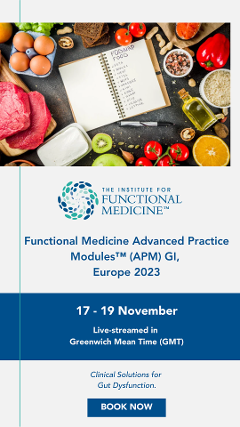insights
The Microbiome and Immune-Related Diseases

Read time 4 minutes
Kara Fitzgerald, ND
Romilly Hodges, MS CNS CN
The human intestinal microbiome acts as a signaling hub that integrates environmental inputs, such as diet and lifestyle, with our genetic and metabolic pathways. Its impacts are widespread across host systems, including the immune system,1 which is capable of adapting and responding to a wide range of challenges. How does the microbiome interact with the immune system, and how do these interactions help determine a state of health or disease in the body?
Cross-Talk: Microbiome & Immune System Balance
Reciprocal cross-talk between the microbiome and cells in the intestinal mucosal immune system is well-documented.1,2 We now understand that this cross-talk is important for immune system maturation and modulation across all developmental stages;3 studies of germ-free mice demonstrate that a lack of gut microbiota leads to significant immune deficiency.4,5 Maintaining a homeostatic balance between microbial activity and host immune response toward the microbiota is what allows the immune system to function appropriately to defend against infection yet also demonstrate appropriate tolerance.6 Commensal microbes are symbiotic species, playing a key role in immune homeostasis. Commensal bacteria produce metabolites such as short-chain fatty acids (SCFAs) and amino acid derivatives that enhance the gut barrier integrity, promote immune-balancing T regulatory (Treg) cell formation, and modulate the production of proinflammatory mediators.3–5,7 Species such as Bacteroides fragilis produce polysaccharides with anti-inflammatory effects—specifically the inhibition of interleukin 17 (IL-17) and enhanced activity of Treg cells.4
Dysbiosis, Inflammation, & Disease
Conversely, an imbalance between commensal and pathogenic species, known as dysbiosis, activates pathogenic mechanisms. Pathogen activation of toll-like receptors (TLRs), found on intestinal immune cells, creates proinflammatory innate and adaptive immune responses, including Th17 differentiation and recruitment of neutrophils and macrophages to the affected site.1,6,8 These effects can be both acute and chronic, if dysbiosis persists. In patients with inflammatory bowel disease, intestinal dysbiosis triggers an abnormal adaptive immune response that increases the pathological inflammatory processes of the disease and destruction of the gastrointestinal tract.4 Intestinal microbial composition is also implicated in the onset of celiac disease in individuals who carry the susceptible HLA haplotypes.5,9,10
Chronic proinflammatory signaling is detrimental to the integrity of the intestinal barrier. This allows for the inappropriate translocation of bacterially produced lipopolysaccharides into portal and systemic circulation and provides a mechanism for TLR activation in sites distant to the intestine.1,4,8 This perhaps surprising, and relatively recent, evolution of our knowledge provides an explanation for research that implicates Porphyromonas gingivalis (found in the oral microbiome) and Prevotella copri in the development and progression of rheumatoid arthritis (RA), as just one example.
DNA traces of these bacteria have been found in the synovial fluid of patients with RA, and prolonged antibiotic therapy against specific bacterial infections, as well as probiotic therapy, have been shown to be helpful with RA disease control.8 The intestinal microbiome is also implicated as a triggering or mediating factor in Grave’s disease, Hashimoto’s thyroiditis, multiple sclerosis, type 1 diabetes, systemic lupus erythematosus, and psoriasis.3
Beyond autoimmune conditions, the activation of extraintestinal inflammation pathways may also be traced back to microbial activity in the gut. The flow of bacterial products to the liver in portal circulation can be a trigger of TLRs and a driver of chronic inflammatory liver conditions such as non-alcoholic fatty liver disease (NAFLD) and nonalcoholic steatohepatitis (NASH).1 Links have also been made with pancreatitis, pancreatic cancer, and diabetes.1 Microbial DNA analysis of patients with atopic eczema, a chronic inflammatory skin condition, shows altered immune-modulatory properties compared with controls.11,12
Given that environmental factors, including diet and lifestyle, play an important role in shaping the gut microbiome, functional medicine provides the perfect opportunity to address dysbiosis and favorably impact the onset and progression of immune-related diseases. Learn more about clinical applications and the latest immune research from functional medicine experts at IFM’s Immune Advanced Practice Module (APM).
IFM educator Kara Fitzgerald, ND, is a clinician researcher for the Institute for Therapeutic Discovery and maintains a functional medicine clinic in Sandy Hook, CT. Romilly Hodges, MS, CNS, CN, is a nutritionist on the team of Dr. Fitzgerald. She has also served as teaching assistant to Deanna Minich, PhD, for the Certified Food & Spirit Practitioner Program and the Food & Spirit Advanced Detoxification Module, which are designed for professionals and incorporate both evidence-based nutrition and holistic well-being.
Related Articles
Intestinal Permeability & Associated Diseases
Innate Immunity: Diet and Lifestyle Support
Prebiotic Foods for Postbiotic Abundance
References
- Cianci R, Pagliari D, Piccirillo CA, Fritz JH, Gambassi G. The microbiota and immune system crosstalk in health and disease. Mediators Inflamm. 2018;2018:2912539. doi:10.1155/2018/2912539.
- Fung TC. The microbiota-immune axis as a central mediator of gut-brain communication. Neurobiol Dis. 2020;136:104714. doi:10.1016/j.nbd.2019.104714.
- Opazo MC, Ortega-Rocha EM, Coronado-Arrázola I, et al. Intestinal microbiota influences non-intestinal related autoimmune diseases. Front Microbiol. 2018;9:432. doi:10.3389/fmicb.2018.00432.
- Shi N, Li N, Duan X, Niu H. Interaction between the gut microbiome and mucosal immune system. Mil Med Res. 2017;4(1):14. doi:10.1186/s40779-017-0122-9.
- Sellitto M, Bai G, Serena G, et al. Proof of concept of microbiome-metabolome analysis and delayed gluten exposure on celiac disease autoimmunity in genetically at-risk infants. PLoS One. 2012;7(3):E33387. doi:10.1371/journal.pone.0033387.
- Pagliari D, Gambassi G, Piccirillo CA, Cianci R. The intricate link among gut “immunological niche,” microbiota, and xenobiotics in intestinal pathology. Mediators Inflamm. 2017;2017:8390595. doi:10.1155/2017/8390595.
- Iddir M, Brito A, Dingeo G, et al. Strengthening the immune system and reducing inflammation and oxidative stress through diet and nutrition: considerations during the COVID-19 crisis. Nutrients. 2020;12(6):1562. doi:10.3390/nu12061562.
- Biscetti F, Flex A, Alivernini S, Tolusso B, Gremese E, Ferraccioli G. The role of high-mobility group box-1 and its crosstalk with microbiome in rheumatoid arthritis. Mediators Inflamm. 2017;2017:5230374. doi:10.1155/2017/5230374.
- Jiang H, Zhang X, Zhou Y, Jiang C, Shi Y. Infection, antibiotic exposure, and risk of celiac disease: a systematic review and meta-analysis. J Gastroenterol Hepatol. 2020;35(4):557-566. doi:10.1111/jgh.14928.
- Transeth EL, Dale HF, Lied GA. Comparison of gut microbiota profile in celiac disease, non-celiac gluten sensitivity and irritable bowel syndrome: a systematic review. Turk J Gastroenterol. 2020;31(11):735-745. doi:10.5152/tjg.2020.19551.
- Oh S, Yap GC, Hong P-Y, et al. Immune-modulatory genomic properties differentiate gut microbiota of infants with and without eczema. PLoS One. 2017;12(10):E184955. doi:10.1371/journal.pone.0184955.
- Chan CWH, Wong RS, Law PTW, et al. Environmental factors associated with altered gut microbiota in children with eczema: a systematic review. Int J Mol Sci. 2016;17(7):1147. doi:10.3390/ijms17071147.





